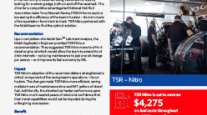Diesel and Gasoline Prices Both Increase
This story appears in the Oct. 15 print edition of Transport Topics.
The average retail price of diesel rose 1.5 cents to $4.094 a gallon, the first increase in three weeks, while gasoline jumped 4.6 cents to $3.850, the Department of Energy said after its latest survey of filling stations.
Analysts said a fire at a Texas oil refinery and disruption in a major oil pipeline contributed to the gains in retail diesel and gasoline prices last week.
Diesel had fallen two straight weeks, dropping to $4.079 from $4.135 before rising last week. The price of trucking’s main fuel is now 37.3 cents higher than it was at this time a year ago, DOE said.
Gasoline also had declined for two consecutive weeks, falling 7.4 cents from $3.878 to $3.804 before rising last week. The average price of gasoline is now 43.3 cents higher than it was at this time in 2011, according to DOE.
Nearly all analysts interviewed said an Oct. 3 fire at Exxon Mobil Corp.’s 560,500-barrel-per-day refining and chemical complex in Baytown, Texas, is pushing price increases. An Oct. 4 oil spill in a stubline of the Colonial Pipeline carrying gasoline from Atlanta
to Nashville, Tenn., added to problems. “Since markets are so tight and that refinery is a big supplier, [the fire] led to a price bump,” said Sean Hill, an analyst with DOE’s Energy Information Administration.
Hill said repairs at the Baytown refinery were estimated to take at least three weeks or longer, “which is why prices have remained relatively elevated — even after the pipeline situation was resolved — and may continue to stay there.”
A second analyst added that diesel consumption during fall harvest season has tightened the fuel supply.
“We’re seeing strong demand for diesel across the country and that’s keeping prices high,” said Phil Flynn, senior market analyst at Chicago’s Price Futures Group Inc. Farmers’ demand for diesel is keeping supplies tight, especially in the Midwest right now, he added.
Jim Towery, president of flatbed hauler Steelman Transportation Inc., Springfield, Mo., confirmed the tightness and price hikes.
“Most carriers have discount programs with different truck-stop chains, but you still have to look for the best bargain,” Towery said. “When the price is squeezed like this, those discounts really shrink.”
Normally, Towery said, prices in his region are the nation’s lowest, but they have risen from $3.80 to $3.90 a gallon in the past week.
In California, diesel prices reached $4.414 a gallon. The high prices stem from an Aug. 6 fire in the central crude oil refining unit of Chevron Corp.’s 245,000-barrel-per-day facility in Richmond, Calif. Chevron said Oct. 9 that the crippled refinery would remain shut for the rest of the year. The curtailed production has left many filling stations without fuel to sell and pushed gasoline to $4.409 in the state, according to EIA.
The shortage of gasoline in California became so dire that on Oct. 7, Gov. Edmund “Jerry” Brown Jr. wrote the California Air Resources Board and urged the agency to waive the normal end-of-October start for refineries to switch to producing winter-blend gasoline.
“Allowing refiners to make an early transition to winter-blend gasoline could quickly increase fuel supply and provide a much-needed safety valve with negligible air-quality impacts,” Brown wrote in his letter.
Brown’s move would permit an early transition to winter-blend gasoline to be manufactured, imported and distributed in California.
With prices high, dry van hauler Fox Transportation Inc., Rancho Cucamonga, Calif., has walked away from shippers that refuse to increase fuel surcharges in the wake of unprecedented fuel spikes in California, said Vice President of Sales David Burns.
Burns wouldn’t identify any shippers his company stopped hauling for, but he said some were major companies.
Some shipper-provided fuel matrixes do not contemplate spikes of 50 cents per gallon, which have taken place in a matter of a week or two, he explained.
“We have gone back to those customers and asked for increases and in most cases our customers have been very understanding, though there have been some we discontinued servicing who refused to agree to a reasonable fuel surcharge increase,” Burns said. This has freed up added ability to serve customers in a market where capacity is tight, he noted.
Burns said running trucks in lanes where money is lost and drivers are delayed is not good business sense. “Today’s operating costs have made us refocus on where we want to go in the future, and keeping drivers and assets profitable is our most important objective,” he said.
Burns added that, in the future, Fox probably will steer away from the shorter hauls out of the Los Angeles and Long Beach ports, where assets get tied up for extended periods of time.
Price Futures Group’s Flynn added that firming crude oil prices are playing a part in the recent rise in diesel prices. Crude had been as low as $88.14 on Oct. 3. It closed at $91.25 on Oct. 10 on the New York Mercantile Exchange.




